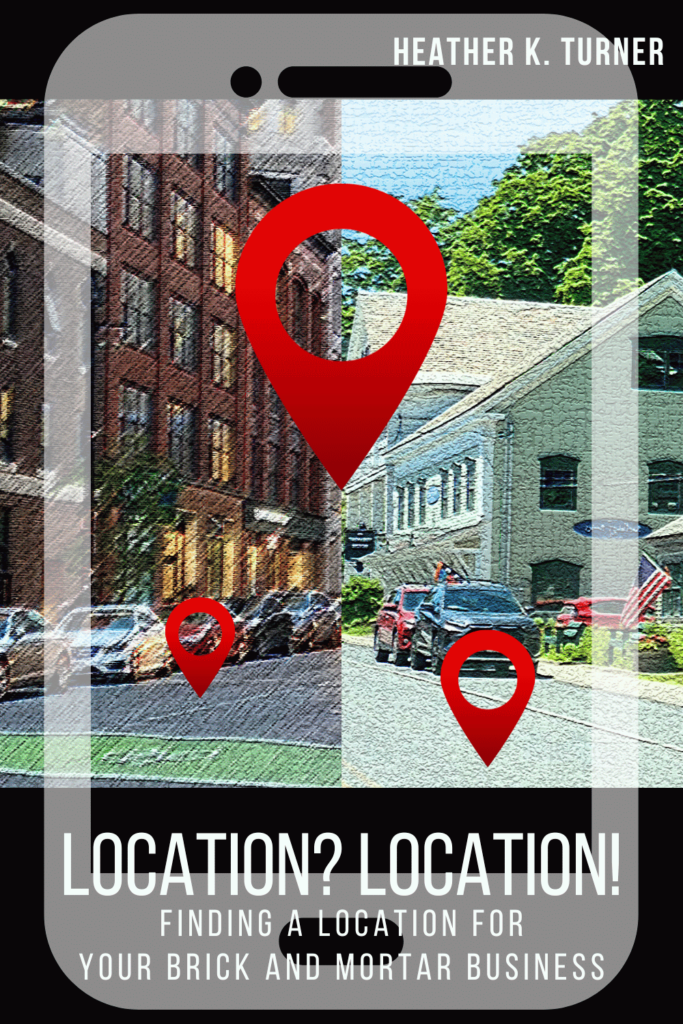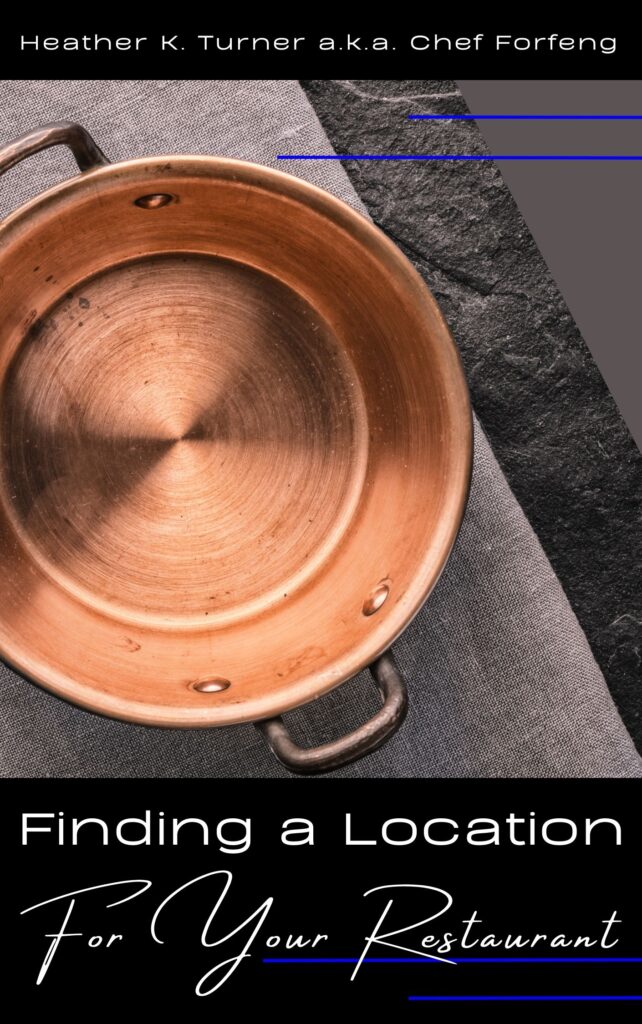by Heather T. | Mar 21, 2020 | Bed and Breakfasts, Blog, Email, Email Marketing, Lodging, Marketing, Operations, Opinion, Social Media
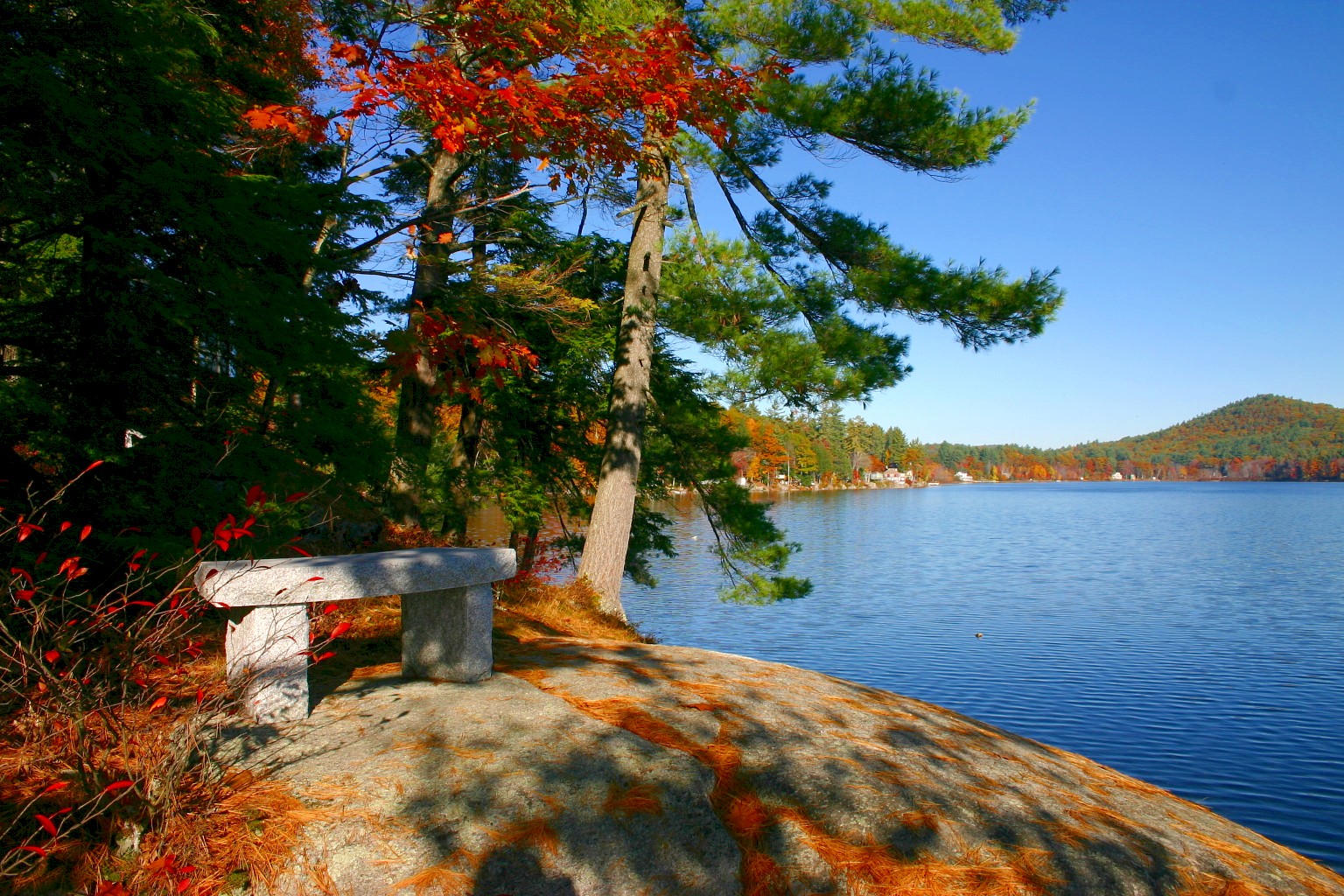 Restore, Engage, Aggregate, De-stress and You = READY
Restore, Engage, Aggregate, De-stress and You = READY
I was talking to one of my innkeeper friends this morning and she said, “It’s funny, we are very depressed because no bookings and everyone has canceled on us for the next few months, not sure how we are going to make it”, but on the bright side, and that I could relate having worked in restaurants for 20 years, this is the first time in 4 years they have had a weekend off.
We ended up talking for a while early this morning and she asked if I could come up with a list of suggestions, not just marketing, but some marketing direction as well as other thoughts, of some things innkeepers could do to be proactive in this very unexpected downtime.
So here goes…….
Are you READY?
In popular Prepper jargon, we have reached S.H.T.F. status (S.H.T.F: Sh*t hits the fan (alternate: stuff hits the fan)) for the innkeeping industry.
I would prefer to think of this as W.A.A.I.T.T. (We are all in this together and “wait” as in this to shall pass).
Well, what to do in downtime? Back in 2012, I had written, Why it pays to sleep around for bed and breakfast owners, I bring this up because I had wanted to do a follow-up article late last year about a place I had stayed at that was top notch but having the owners/innkeepers/management stay in each room would have taken it up even one more notch.
Needless to say, it’s one of several hundred blog posts started and life (as an innkeeper you can relate) and work got in the way of writing it fully. But every property can up their game a bit.
Now: Step One, Take a vacation in your own inn, but use it to fix things, observe things, make them better…..
While your inn is either closed to the public or does not have reservations I would challenge innkeepers to pack their bags for a two-night minimum stay including incidentals, i.e. your big bottle of shampoo and can of shaving cream, go ahead and pack it so you are not using the in-room amenities, but also because it’s not like TSA is going to nab you for bringing anything over 3.4 oz. ?
Pack as if you were going on vacation and also as if you were going on a business trip, cell phones, cords, laptops, the works.
With one prerequisite, you need a notepad in the loo and a notepad in the main bedroom and any other rooms (example a suite with sitting area) with writing utensils, and no it’s not in case you run out of toilet paper. ?
Unpack or get comfortable just like you would if going to stay at another B&B. Then observe, REALLY observe. See those small ding marks on the baseboards? You’ve cleaned and dusted them a million times and noticed them but not “really” noticed them, fix it now.
This is what the notepaper is for, make notes if you can’t fix something right at that very moment and make sure you get back to it and do it this time.
In the bathroom is there room for your makeup case and your partner’s knickknacks on the sink and or shelf? Is the lighting really “that” good?
When you take a shower, can you reach the towel rack easily and is there a place to hang it to dry that works?
I’ve lost track of places that have hooks galore in the bathroom but oddly enough there seems to be some sort of magnetic polarity between the hook and towel as they never seem to want to stick together…… Make notes, now is the time to move that rack, etc.
Breakfast time. Go make breakfast as if you would for guests, then go BE the guest, sit at every seat and every table and eat and observe.
If you have a purse, bring it, is there a place to put it or can you hang it on a chair? If you are going to go out right after, bring your coat, is there room between chair and next chair to put it comfortably? And observe, observe, observe.
This reminds me of a friend who had an inn up here in NH, she had glowing reviews but very occasionally an odd one, not bad just a little odd. We did the dining room flow test (i.e. how people move around and spatial distance between tables and chairs to walk as well as check sightlines, one table of two had a viewpoint from a guest’s perspective right into the little bathroom that adjoined the dining room. What do you see? Test every chair and every point of view.
Wait…..before you take a bite of the food you made, whip out your cell phone and take a slew of photos, be one of those obnoxious Instagrammers.
And make a note, is the lighting good enough for decent photos? If not, what can you do to fix? Bonus, now you have extra photos for marketing……..Food Photography Tips for Bed and Breakfasts might be helpful if you want to up the visual game a bit.
Now go clean up…….or don’t, remember you ARE supposed to be on vacation so do it later. Make it a working vacation. Go take a walk around your neighborhood. I don’t know how many innkeepers I’ve talked to that either have never actually walked to what is around them for a several mile radius or they go out and they walk, but just to walk, i.e. go out and get exercise, but don’t actually take a lot of notice of what is around them.
Take your phone with a full charge and go and take A LOT of pictures, make some notes, actually see and observe the lovely things locally to you that you probably never noticed before. The hidden springhouse covered by wisteria, the small park bench hidden behind the bushes. That great little antique shop (now closed because of the crisis but will reopen) but you never knew or noticed because they don’t have a presence online. Take MORE pictures and don’t forget to wave to your neighbors and share a smile.
Go back to the inn, rinse, repeat for a few days.
Now do a deep clean of the room, wash all linens and suggest bagging them in plastic until the next usage. Document document, document the cleaning of the room so when we get through this and reopen, A. you are all set to go and B. You have proof (take some pictures too) that the room has been deep cleaned and sanitized and that you, the innkeeper were the last person to stay in it.
Now go on vacation in another room, rinse, repeat.
And do some of these other things while you have some downtime in between having weekends off for the first time since you became an innkeeper. I say that tongue in cheek, but I reference what my friend the innkeeper said to me at the start of this post….
- Do some videos, do A LOT of videos, small 1-2 minute clips, virtual tours are good, do a video walkthrough of your inn with commentary or some videos of the area, with commentary. Learn how to leverage Youtube. A great resource for learning Youtube is Youtube Creator Academy, it’s free and it’s super helpful.
- Test some new recipes out, take LOTS of pictures. If you don’t have the ingredients or don’t want to use up food, hey you have to eat anyway, but if you don’t want to experiment now, go research some new ones to try when you are back up and with guests again.
I love to find new recipes or at least in my case, some ideas from:
And many more, both Taste Cooking and Epicurious have great email newsletters with recipe suggestions.
- Create a marketing plan for the rest of the year and start compiling content and pictures. We hopefully will be over this by midsummer or hopefully sooner, what holiday can you target and get pre-prepared for right now?
One of the biggest complaints I hear from innkeepers when talking about planning their marketing and social media, is “we don’t have time”. You do now, take advantage of it!
How to Write a Social Media Strategic Plan for Bed and Breakfasts and Planning Ahead for Your Bed and Breakfast Promotions might be helpful.
- While restaurants and other businesses may be closed or operating in a limited capacity, now is the time to make those good relationships and network, pick up the phone, learn a new skill and try video conferencing. Making those valuable connections and do some deals so that when everything picks back up, your inn and the businesses you and your guests engage with are all ready to rumble.
- Do a deep clean of the inn, and I know some innkeepers are not able to find cleaning supplies, do some outreach to a local restaurant who may be closed or operating in a limited way, do they have some cleaning supplier (or even food if needed) they want to barter or sell?
- Put a plan in place for if this happens again or something like it. While it’s too late to get business interruption insurance, for example, investigate who offers it and rates and be prepared.
- Take some time and educate yourself so you can better help your business and be more informed and less likely to be snowed by an unscrupulous company Google Analytics Academy for instance is free.
And most of all, while we are all supposed to be practicing social distancing, it doesn’t mean you have to practice social isolation. Reconnect with some old friends online, make some new. Start some virtual networking meetings. An innkeeper told me they are now doing virtual tea parties as well as virtual happy hours, sounds like fun to me!
by Heather T. | Mar 9, 2020 | Bed and Breakfasts, Lodging, Marketing, Operations, Opinion
 Threat or Opportunity? I’d say a bit of both. People are scared. I’ll admit I am one of those people that has that nagging feeling in the back of my skull going, “pay attention, pay attention!” and I admit we are prepared to go for several weeks if under self (or otherwise) quarantine if need be. But we prepared for that in advance because we have been through situations like being out of power for more than a week in below zero temperatures several times among other life events. It only takes one life learning lesson to forever be ready for this.
Threat or Opportunity? I’d say a bit of both. People are scared. I’ll admit I am one of those people that has that nagging feeling in the back of my skull going, “pay attention, pay attention!” and I admit we are prepared to go for several weeks if under self (or otherwise) quarantine if need be. But we prepared for that in advance because we have been through situations like being out of power for more than a week in below zero temperatures several times among other life events. It only takes one life learning lesson to forever be ready for this.
Families and businesses need to think about these things, up here in New Hampshire, while we are less likely to have a major earthquake (it could happen) we could have floods, we could have forest fires if we have another severe dry season. A business needs to be prepared. I won’t parrot the hundreds of websites telling you what you should have to stock up on because Google is your best buddy for that, please don’t go and buy up all the toilet paper in the store, others need it to (bonus for innkeepers though you probably already have a pretty good backstock) but regardless of whether the virus scare affects your property or not, this is a good reminder that you should have those supplies in place anyway.
The virus scare if you think about it, isn’t any different from a major tornado, flood, hurricane or earthquake affecting a property. A bit better actually, any of those listed can result in a loss not just of business revenue but of a property itself. At least this is just lost revenue, your property could have washed away in a flood…… Not to make light of this but to put it into perspective.
I think lodging facilities have some opportunities here that they should take advantage of.
One is educating the public about how a B&B is also your home, you as owners/occupiers/innkeepers are good about sanitation over and above a hotel or motel or Airbnb anyway in a normal situation. I’d much rather stay at B&B normally anyway but especially right now rather than a hotel not just by choice but because I’m pretty sure it’s a heck of a lot more sanitary then your average hotel is at the moment.
Two, yes revenue may and probably will go down for the next few months as travelers are canceling vacations and business trips, but this presents a unique opportunity to capture eyeballs online. If I had to self-quarantine and I could not work at home for whatever reason, I will be in the category of what are most people going to be doing and spending time on if stuck at home or elsewhere? On Social Media of course.
The average innkeeper does not have a ton of time to leverage social media because they are working 24/7, think of this as mud season in New England, it’s the slow time of year when you can get caught up with things. Funny enough and lucky enough at least for New Englanders its almost mud season, so the timing could be a lot worse.
Use this opportunity to start pre-writing posts, take more pictures of your breakfast and your property and planning out some marketing for the rest of the year. When and I will stick with “when” everything is sorted out, people will want to get out and resume normal activities, including putting those vacation plans that got canceled back into consideration. Getting in front of their eyeballs when they are literally a captive audience is a great opportunity.
If you don’t know how to use a social media platform, Google is your friend, but so are the channels themselves, there are so many free resources out there to help a business owner better leverage themselves online. Take the opportunity to educate yourself a bit more instead of letting stress overwhelm you, as that doesn’t accomplish anything (aside from weakening your immune system) so one more reason to keep yourself occupied. Again not trying to make light of the situation but being realistic.
So what happens if it doesn’t blow over, what if we have a major pandemic? I don’t know, no one can know but isn’t it better to be proactive for when it does blow over rather than saying if it doesn’t?
There has been a lot of articles reiterating the same thing, wash your hands, sanitize, etc, yes please do all of those but not many articles out there as yet with actual good suggestions on how and what to do to weather this situation. Here are two recent ones of note that I would suggest a read through though because I think they had some good ideas for innkeepers to take note of:
How Can Hotels Survive the Coronavirus? Some good advice if your property is concerned: Six lessons emerge. All of her touchpoints are important but I think Be wary of broad-scale discounting and Don’t cut your marketing budget (and I’ll add to this, even if you are not spending money, the marketing budget is your own time, it’s ROTI, Return on Time Investment, boost that, not cut it) are two things to take special note of.
Does Your Property Have A Coronavirus Strategy? Is another suggested read. Of note here (and he also recommends staying away from the deep discounting) Mandate a “single voice policy” for all employees and departments (yourself) and Provide honest and up-to-date information regarding the situation in the hotel location/destination are both important for a property to note.
ALP has published several blog posts with resources and we will continue to keep it updated with new articles and resources as well.
What else can you do in the interim, I personally love the Beechmere Inn’s approach to this, educating their guests about what the facility is doing to help protect guests, but I also had a question raised by an innkeeper client of mine, “Well what happens if you still have a guest catch the virus (at your inn) or a guest infects others?” Will I get sued?” “Americans are so sue happy, what do you think?”. I’ll be honest I don’t know if someone came to stay at an inn and they were sick with any kind of issue and infected others the impetuous should be on them, but I am not a lawyer.
If you did everything you could to protect guests you did all you could. I’ll take a recent example of the first case diagnosed in New Hampshire for this. The person was told to stay home, he did not and went out and went to a private event and infected at least one if not more (news developing apparently) people, the facility this happened at is handling this well and being proactive. But that kind of thing is just stupidity at its finest and you can only do what you can do.
I don’t believe in fear-mongering and I don’t think it helps if innkeepers are posting all over the place about this, but I don’t think it hurts to help educate guests now and in the future about the safety of your facility, it can be done in a polite and in a no scare tactic way manner.
When life goes back to normal, people are probably still going to stay fairly local, so if you have not yet invested time into researching and targeting the staycation/localcation market, now is a good time to spiff up on that as well. Use this as an opportunity to get your property out there. Run a SWOT analysis on what your B&B can do to mitigate and potentially profit from this long term when we recover from this, and I’ll stick with the “when” not the “if”. In the famous words of Yoda (if he was a marketing guru) “Marketing Never Stop”.
And as an additional note (updated 3/11/2020) I take this very seriously, my own business along with many others besides just the hospitality industry is, and will continue to be, affected. Having several large projects put on hold for an indefinite period of time IS very concerning, but I am going to use this as an opportunity to learn and increase my knowledge of things that can help myself and my clients in the future. If we go down the rabbit hole of depression and inaction, when recovery time comes around, it makes it that much harder to rebound when it’s time.
by Heather T. | Aug 9, 2019 | Bed and Breakfasts, Lodging, Opinion
 Yes, this is a bit of a rant and I won’t apologize for it because this makes me quite angry, actually, it totally fries me. I work with REAL B&Bs, and yes we do encourage B&Bs to list on Airbnb, know and utilize thy frenemy so to speak. It takes less of a commission then the OTAs (Booking.com, Expedia, etc.) among other things. A REAL B&B is one that is licensed, insured and yes inspected (at least in the US) to serve breakfast, many having to take Servsafe Courses as well as having many other business licenses to operate as a legitimate business.
Yes, this is a bit of a rant and I won’t apologize for it because this makes me quite angry, actually, it totally fries me. I work with REAL B&Bs, and yes we do encourage B&Bs to list on Airbnb, know and utilize thy frenemy so to speak. It takes less of a commission then the OTAs (Booking.com, Expedia, etc.) among other things. A REAL B&B is one that is licensed, insured and yes inspected (at least in the US) to serve breakfast, many having to take Servsafe Courses as well as having many other business licenses to operate as a legitimate business.
I have a Google alert set up for Bed and Breakfasts daily for new Bed and Breakfasts opening, B&Bs in the news, new ideas on specials and packages that I can suggest to other B&Bs, B&Bs closing, a write up about them and other things B&B related. Pretty much every damn day in my alerts, I get at least one “New B&B opening in XXX”, “Bed and Breakfast offers Unique Package to Visitors”, “Bed and Breakfast Burns to the Ground, people barely escape,” “B&B fights new zoning rules”, “Man dies at B&B when using swing, branch falls and kills him,” “Kitten B&B open in New Jersey” and on and on. I have to admit that the last one was super cute but I digress. All of these headlines are NOT about REAL B&Bs, they are about Airbnbs, which many journalists synonymously interchange these words throughout the articles as if it were the same thing.
I have nothing personally against Airbnb or the average person running a small-scale Airbnb, but the industry I work with, REAL B&Bs, are most definitely affected by it. I know way too many B&Bs that have gone out of business because they can’t compete with market and lodging saturation from local Airbnbs.
Why would someone stay at a REAL B&B if they can stay at an Airbnb for cheaper? AH HA, So they think anyway. If one adds up the costs of staying at an Airbnb, plus Airbnb fees, plus cleaning fees, it is generally comparable to what the local B&B costs for the same type of room, but a real B&Bs costs already include those cleaning fees and amenities built-in, plus you get breakfast. AND if you break a leg going down those pocket stairs in the back, they do have liability insurance to cover it (Unlike most Airbnbs).
Not even going there about Airbnbs serving food, aside from the fact that you go to an Airbnb and get deathly ill, do you think their insurance will cover it? Probably not. Enough said (for now). From a long history of food service on my end, I’d get up in arms if a local place opened up its door and called itself a café, but had no inspections, no visits from “the Man”, no legal venue to serve food at. I’d have a cow.
Grandma renting out her spare room because she needs to supplement her Social Security, good for her! Parents renting out their son’s room to help pay off college tuition, I get it! Landlords taking whole rental properties off the regular housing market, in Seattle for instance, I found one apartment building with over 50 units, all renting them out on Airbnb. No, definitely no! For those out there that think Airbnb is the next best thing after sliced bread, ever have a discussion with someone looking for a long-term house rental in New Orleans or Toronto? Please do! It’s very enlightening.
I could go on about the unfairness of REAL B&Bs having to pay all of the things that a regular business has to pay, regular taxes, inspection fees, liability insurance, advertising, having to pay for business taxes including a an actual website to advertise, commissions to the OTAs, ridiculous website accessibility lawsuits, etc, but that’s not the point, it’s that many journalists are helping blur the line and spread the misconception that an Airbnb is the same exact thing as a REAL B&B.
It springs to mind a conversation I had with a friend fairly recently, she had just come back from traveling to the Hudson Valley in New York state. “Oh we stayed at this lovely Bed and Breakfast in the Upper Valley! It was so cute, the lady had a couple of small children who were really sweet and she made this fantastic sausage frittata for us the day we left”. “Which B&B?” I asked, as I know many of them there but none sprang to mind where the innkeeper’s small children were underfoot. “Oh I don’t know, she didn’t have a name, we found her on Airbnb.” It was (after looking it up because I was curious) an actual Airbnb, not a B&B, but my friend didn’t know it wasn’t the same thing, we had a rather lengthy conversation after that about the differences.
Ironically she went on to say that as they were driving back to Pennsylvania, both she and her husband got quite sick in the afternoon (remember that frittata?), she blamed it on the restaurant they ate at the night before. On average food poisoning takes two to six hours to affect someone and while eating contaminated food occasionally can take a few days to affect someone, I’d venture to guess it wasn’t the restaurant food that got her and her hubbie both having to make pit stops every ½ hour on the way home, a 5 hour trip, apparently it was not a fun drive back, can’t imagine why. No comment from the peanut gallery on that one because nothing is needed……..
And people wonder why there is so much confusion about is it an Airbnb or a REAL B&B, journalists are not helping. I am not going to cry fake news, because it’s not fake, it’s uneducated. I’ve had over a dozen conversations with journalists doing articles in the past year about B&Bs, the state of the industry and other topics, and to almost every one of them I had to explain the difference between an Airbnb and a REAL actually living and breathing B&B, and it’s sad that it takes that to have to open their eyes. For those that think I have a hard on for Airbnb, please re-read the 6th paragraph down, I don’t but I do have an issue with them not being differentiated from REAL B&Bs, and for large landlords making money at the expensive of people in tight housing markets.
Please, dear Journalists, read up on the difference between an Airbnb and a REAL B&B, talk to some Airbnbs and REAL B&Bs and educate yourself on the difference so you can help educate others, look into some of the state and regional B&B associations many of which have inspection and other standards for their members, confusing the masses is quite frankly not helping anyone and it’s certainly not helping innkeepers who can actually claim the title of innkeeper legally. ☹
by Heather T. | Jan 30, 2018 | Bed and Breakfasts, Lodging, Marketing, Social Media
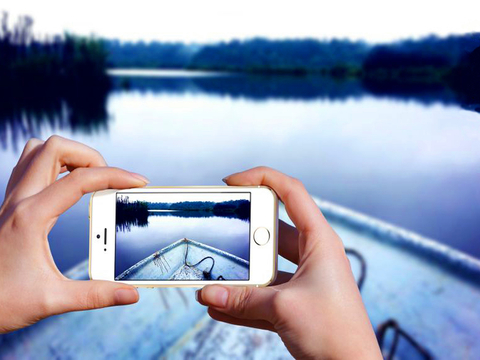
Last January, my how time flies! I wrote a blog about how video is hot (and it’s still getting hotter) and live streaming: Ideas for Bed and Breakfasts using Video and Live Streaming, which I would encourage B&Bs to review, because video is here to stay and will continue to advance and perhaps dominate marketing in the years to come.
I wanted to follow this up with the checklist I had made up that might help B&Bs prepare a little bit if they were going to do video to promote their B&B, or they wanted to play around with Live Streaming Video.
Checklist for doing a Live Streaming Event:
- Check Lighting. Try to avoid windows with bright sun streaming in. Turn on room lights and check for glare on camera.
- Tripods in place if needed.
- Preview movement for “in camera” objects, pre-video walkthrough or still photos.
- Sound Checks with pre-recording.
- Mute phones and cell phones if possible.
- Turn off radio and/or TV.
- Cue cards if needed for talking points.
- If doing a recipe demonstration, have your mise en place done in advance.
- If having people participate, get photo/video permissions, in writing if possible.
- Check your appearance and anyone else’s in the video in advance.
- Test your internet connection and speed.
- Video in Facebook is muted by default, so make the opening reflect your topic or reflect a brand.
- Share on as many channels as you can..
- Be cognizant that many people may be watching on smartphones, so filming with your smartphone in the vertical position is suggested.
- Time Yourself, Videos should be one to two minutes long at the most. If you are posting the videos to Youtube, keep in mind that Youtube Creator will let you edit videos as well as stitch them together.
Have you done some recent videos or live streaming events at your Bed and Breakfast that you would like to share? Please do in the comments, as I am always looking for example to show to other B&Bs!
by Heather T. | Dec 13, 2017 | Bed and Breakfasts, Blog, Equipment, Lodging, Operations
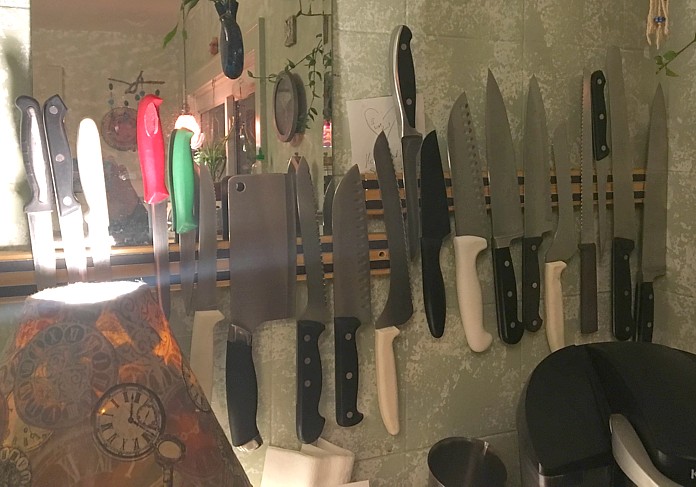
Knives have come a long way since I graduated from the Culinary Institute of America in 1992, plus there are a lot more brands out there that were not available than. Ask any professional chef or anyone else that loves cooking, whether for pleasure or for a profession, you will get a completely different answer as to the best knives, the best brands and their favorite type of knives. So this article aims to be more informational than opinion, so that the reader can choose their own with more direction.
I personally have always had (and still have) primarily Wüsthof and Henckels (J.A. Henckels) knives, and Dexter (Dexter Russell) for the ones I can badly abuse. My original knives that I used while cooking professionally, I still have almost all of them (several many inches shorter due to years of sharpening-photo above of many of them) with the exception of a boning knife that met a sad end when my husband snapped the tip off (he has since replaced it for me, such a sweet guy). A good knife lasts for a very very long time with TLC, and it’s something to keep in mind when shopping for knives, because you might go into some sticker shock looking at good quality ones, “Just HOW much is that paring knife????”. A good knife will last you decades, and can be kept in the family for many generations. I still have a Wüsthof utility (paring) knife that my Grandfather bought back in the 1920’s before he immigrated from Norway to America, and it’s still a great knife, and it still holds an edge.
Knives are a matter of preference. A lot like a car, there are certain things you want to look for when knife shopping. I would suggest adding to your knife collection slowly. Sets are great, but either you outlay a huge amount of money for a good set, of which you will realistically only use half of the knives a lot, and the others rarely, if at all, or you buy an inexpensive set and you get what you pay for, OR you can think about what you actually need, and invest in them slowly, which is what I would recommend.
Knife Storage:
Storing your knives properly is very important, if you must keep knives in a drawer, I would suggest either getting a custom rack insert for the drawer, or buying plastic knife guards for your knives.
Wood block storage is also very popular for knives; the two things I would caution users about is: don’t, under any circumstances, put your knives away wet, while wood doesn’t hold bacteria as well as plastic, if you do get any type of food contaminant or other particles in the holes you can have problems. When placing knives into the block and removing them, make sure you sheathe and unsheathe the knives with the blunt edge of the top of the knife coming into contact with the knife slot, and not the sharp side. This will help maintain sharpness.
My personal favorite for knife storage is a wall mounted magnetic strip, you can see all your knives at a glance and the risk of them dulling while coming into contact with something else is minimized. The magnets are strong, so be careful when placing your knifes on the rack, as improper placement can also cause some damage.
Some basic rules for knives:
- Always dry your knives after use.
- Never put them in the sink if dirty, or in a sink filled with water. (while this is common sense, I’ve lost count of the number of B&Bs (and sadly restaurant kitchens as well) I’ve visited that have been guilty of doing this.) While it’s not only extremely unsafe, you risk causing damage to your knives.
- After sharpening a knife, rinse well before use. I prefer washing it and than drying it, but don’t go directly from sharpening to cutting, at least wipe it down if nothing else.
- Keep your knives sharp! A dull knife will cause more damage and rip the skin if you cut yourself, vs a clean cut from a sharp knife which will heal faster and cleanly.
- Never put your good knives in the dishwasher! The wash cycle in a dishwasher vibrates silverware against your knives and contributes to dulling. It can cause delamination of some types of handles, and cause rivets to come off or loosen contributing to unsafe knives, plus most dishwashing liquids, detergents or pods contain caustics ingredients which can damage and pit your knives.
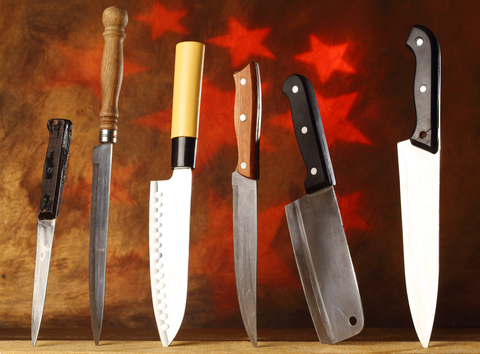
(Look at the above stock photo, look at the knife on the far right side, a rivet is missing and the handle is cracked, leading to an unsafe knife, as the partial detachment from the tang could result in the knife coming apart during use. The crack can also harbor food particles and bacteria.) You should never do this to your knives, even good quality ones can break a knife tip doing this.
Things to look for when knife buying:
The Tang: I really recommend buying full tang knives. Over many years, using other’s knives or “house” knives (what many professional kitchens have for cooks in addition to their own), I’ve found that knives with partial tangs have a short shelf life, they break and they are dangerous when the adhesive that connects the knife tang with the handle comes apart, especially if it’s being used at the time. I’ve seen many stitches as a result of injury’s caused by partial tang knives literally disintegrating while being used. I recommend meandering over to Lansky Sharpeners, who has a very good overview of knife tangs.
The Grip: the grip is a preference, what is it made of? Plastic, rubber, steel, in some cases cork and other materials. Make sure when you buy a knife, especially a Chef’s knife that you will use for chopping, the handle fits well in your hand and is comfortable, I was never a big fan of Victorinox knives (and they are great knives) because I have smaller sized hands, and the handles never felt very comfortable to me, again it’s a personal preference. Wood grips on knives tend to not hold up well under long term use. When knife shopping you may find a better price online for the knife you want and buy it there, but I’d suggest handling them first so you can see what it feels like in your hand and the balance.
Ever sharp knives: to own or not to own. I admit we have several in my house, I rarely use them but my husband does. If you want low maintenance knives, then yes these are the knives for you, but they are not “really” forever sharp. They do dull with repeated use, and you can’t re-sharpen them easily, sometimes not at all.
Riveting and Joins: When buying knives look for the joins and rivets, and see if the handle moves at all when you push the blade sideways. Good quality knives will have zero give, but many generic knives out there, while they look nice, are quite flimsy and not made for heavy duty use.
What are they made of?
Carbon Steel: this the traditional material used the most for the past few hundred years. It can hold an extremely sharp edge, but it does discolor easily. It will discolor some foods, like onions and citrus, as well as you can actually smell what seems like a chemical odor coming from it, and may leave a metallic taste. This doesn’t mean you shouldn’t use Carbon Steel with these, but it does mean that the acidity in onions and citrus can cause pitting of the blade, if you do use them, wipe the blade down every few minutes in between uses. I find if you are cutting a lot of meat or filleting fish, a carbon steel knife, I personally find, will do a better job as it’s holds an edge the best. Rubbing the blade down with a paste made from water and baking soda when you first get it (and repeat for the first few weeks) helps protect the knife and build up a good patina. Carbon steel knives will change color with use.
High Carbon Stain Free Steel: This is a relatively new alloy that combines the best features of Carbon Steel and new modern alloy metals (Chromium-Molybdenum Steel). Most modern higher end knives are made of this and it’s suggested for professional use.
Stainless Steel: this will not rust or corrode, but is a very poor choice for knives, it’s brittle and it is difficult to keep a very sharp edge on a stainless steel knife.
Ceramic Cutlery: This is a newer process made with modern age ceramics, often zirconium dioxide. Ceramic knives are substantially harder than steel knives, they will not corrode and work well for slicing vegetables, meat (boneless), fruits and bread. The downsides to ceramic, is it’s just like a plate, if it gets dropped, it can shatter or chip. Ceramic knives are not recommended for use with hard to cut items, like bones or frozen foods. While ceramic holds an edge a lot longer than carbon steel, once the edge degrades it needs a professional to re-sharpen it.
Damascus Steel: This is not “true” Damascus, that art has been lost for a long long time, these knives are basically laminated pieces of steel together, and quality can vary a huge amount depending on the maker. If you have a magnetic knife strip that can display your knives where your guests can see them, you will have the oh and ah factor, as they can be quite beautiful, but most of these knives will not outperform a regular good quality knife.
Some Quality Knife Brands:
Aritsugu http://aframestokyo.com/aritsugu.html (there are other sites out there that carry Aritsugu, the Aritsugu site itself is in Japanese).
Global http://globalknives.uk/
J.A. Henckels http://www.zwillingonline.com/
Masamoto http://www.masamotochefknives.com
Messermeister https://www.messermeister.com/
Shun https://shun.kaiusaltd.com/
Victorinox (formerly R.H. Forschner by Victorinox) https://www.victorinox.com/global/en_US/
Wüsthof http://www.wusthof.com
Honorable Mentions (great for knifes that can take some abuse, inexpensive and good for general purpose knives)
Dexter Russell http://www.dexterrussellcutlery.com/
Additional Knives:
MAC https://www.macknife.com/ (While reputedly a great knife brand, Thomas Keller and Charlie Trotter apparently love the line, the quality does seem to be there and it shows well in use.) I can’t say with certainty that this knife line will hold up well under long term use. I’ve test driven several of these, but unlike any of the above knife brands that I have used over the course of many many years, this one is a newer addition to the traditional brands. If you do decide to buy one of these, I would suggest the MTH-80 Professional over the TH-80 Chef Knives. The MTH-80 while the more expensive, is the better knife.
If anyone has any interest, I can do a follow up post on this with a suggested list of what to buy (or at least start out with) if you are just buying a bed and breakfast and need to stock the kitchen with equipment.
And an additional article with some useful tips 25 Tips And Tricks About Chef’s Knives- Every Chef Should Know.
by Heather T. | Aug 28, 2017 | Bed and Breakfasts, Lodging, Marketing, Social Media

Today I was supposed to teach a short instructional webinar on using Youtube Slideshow Creator. A very useful tool that I found out this morning (when I logged in to Youtube) that it’s being retired on September 20, 2017. Apparently, they had put out a notice (not very widely apparently) that is was going away permanently a few months ago. I did know that Youtube is revamping it’s Creator studio, which I have Beta access to, and am quite excited to see the full version of, but I was unaware of this. Caught a bit by surprise as I usually know about most social media changes way ahead of time, I am to say the least, extremely disappointed they are retiring this feature as it was very useful for B&Bs. The explanation is “that it was not widely used”, similar to Facebook retiring it’s lists feature earlier this year (and there is a workaround for them at least) the feature was a victim of the fact that hardly anyone used it, because most didn’t even know about it.
If you do want to explore Youtube slideshows, you have until the 20th to do so. Youtube says it won’t be doing away with any videos created with it prior, so if you have a few minutes and some good still photos, take advantage of it now. The slideshow feature can be replicated with other programs (I am looking into good suggestions for replacing) but access to the availability of royalty free music (that Youtube provides with the slideshow creator) is not as easily replaced.
I had done a blog in 2014 about using the slideshow option, so if you would like to play with it in the interim of the feature going away, please visit https://chefforfeng.wordpress.com/2014/02/27/how-innkeepers-can-leverage-youtubes-photo-slideshow-option/. You may need to use Firefox (recommended), Safari or Internet Explorer as Google Chrome is blocking the Flash plugin used to create the show.
If you have a current version of Powerpoint (within the last 4 years) there is an option of turning your slides (with effects) into a video that is uploadable to Youtube.
While there are literally 100s of options for programs to do slideshows and export to video ranging from $29.99 to $99.00, and many more in the higher price ranges with more bells and whistles, there are not many options out there for free.
Windows Movie Maker (PC only) (http://www.windows-movie-maker.org/) is one option that Windows users can download for free. Avid Media Composer (PC or Mac) is another, but maybe for the more technological inclined (http://www.avid.com/media-composer-first). I would very much recommend not downloading many of the other options that tout themselves as “free” without first checking them out heavily online. Many contain Spyware and Adware which can be even more malicious, and in many cases much harder to get rid of than regular viruses.
Kizoa (https://www.kizoa.com/) is one online option, but the free version limits what you can do. I have not trialed the paid version but it looks promising. There are several others online as well that offer “free” but with limitations as well. I’d recommend testing out the online ones available, with the caveat be careful what links you click on, especially if the program landing page has lots of ads on it, similar to the downloadable options for slideshow editors, be cognizant that some links may take you to malicious sites.
We are continuing to research other options for this and will post an additional post when (and sadly if) we find more comparable (free) equivalents to Youtube Slideshow Creator, Avid we had been aware of prior, and Kizoa we came across today and trial tested (and recommend to check out as a possible option) after looking at and testing about two dozen other options today.
 Restore, Engage, Aggregate, De-stress and You = READY
Restore, Engage, Aggregate, De-stress and You = READY
 Threat or Opportunity? I’d say a bit of both. People are scared. I’ll admit I am one of those people that has that nagging feeling in the back of my skull going, “pay attention, pay attention!” and I admit we are prepared to go for several weeks if under self (or otherwise) quarantine if need be. But we prepared for that in advance because we have been through situations like being out of power for more than a week in below zero temperatures several times among other life events. It only takes one life learning lesson to forever be ready for this.
Threat or Opportunity? I’d say a bit of both. People are scared. I’ll admit I am one of those people that has that nagging feeling in the back of my skull going, “pay attention, pay attention!” and I admit we are prepared to go for several weeks if under self (or otherwise) quarantine if need be. But we prepared for that in advance because we have been through situations like being out of power for more than a week in below zero temperatures several times among other life events. It only takes one life learning lesson to forever be ready for this. Yes, this is a bit of a rant and I won’t apologize for it because this makes me quite angry, actually, it totally fries me. I work with REAL B&Bs, and yes we do encourage B&Bs to list on Airbnb, know and utilize thy frenemy so to speak. It takes less of a commission then the OTAs (Booking.com, Expedia, etc.) among other things. A REAL B&B is one that is licensed, insured and yes inspected (at least in the US) to serve breakfast, many having to take
Yes, this is a bit of a rant and I won’t apologize for it because this makes me quite angry, actually, it totally fries me. I work with REAL B&Bs, and yes we do encourage B&Bs to list on Airbnb, know and utilize thy frenemy so to speak. It takes less of a commission then the OTAs (Booking.com, Expedia, etc.) among other things. A REAL B&B is one that is licensed, insured and yes inspected (at least in the US) to serve breakfast, many having to take 



